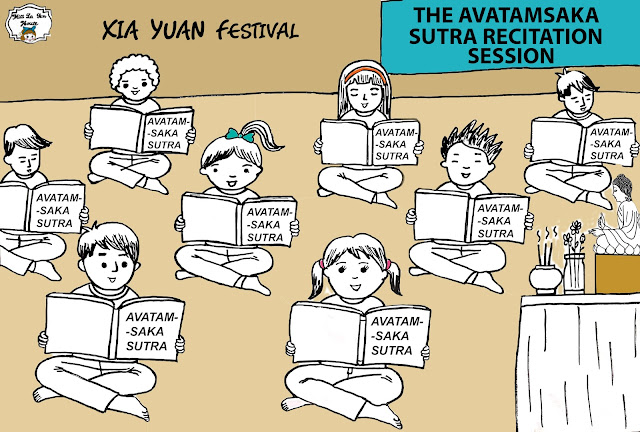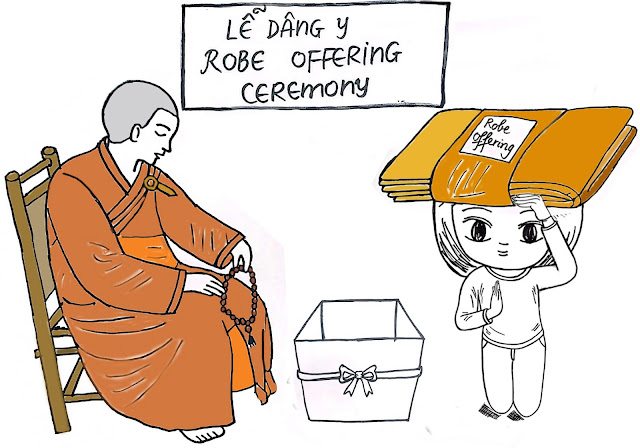Triều nhà Minh, niên hiệu Sùng Trinh, có Phật tử họ Triệu là người rất tin Phật pháp.
Bà bị mắc chứng bệnh gan lách sưng to, rất đau đớn thống khổ.
Bệnh khiến bà Triệu chỉ muốn chết đi cho khỏe, không bị hành hạ thân xác thống khổ nữa, bà đi chữa trị khắp nơi đều không hết.
May sao, bà được gặp vị thiện tri thức khuyên bà nên chí thành niệm Phật A Di Đà, niệm Danh của Quán Thế Âm bồ tát 108 lần mỗi ngày.
Hàng ngày lại nên chăm chỉ tụng 1 phẩm kinh Hoa Nghiêm và 1 lượt chú Đại bi.
Bà thích và chuyên tụng Phẩm 24:“ĐÂU SUẤT KỆ TÁN”, Kinh Hoa Nghiêm.
Bà Triệu do tín tâm Phật pháp nên mỗi ngày đều trì tụng kinh, thần chú, rồi xưng niệm hồng danh của Phật, Bồ tát rất chí thành, chẳng dám lười biếng.
Sau 4 tháng, thì bà Triệu đã thuộc phẩm 24 kinh Hoa Nghiêm và cả thần chú đại bi rồi.
Đồng thời, bà còn phát nguyện ấn tống 1,200 quyển in phẩm kinh Hoa Nghiêm này.
Khi bà vừa ấn tống đủ 1,200 quyển kinh in phẩm 24 trong kinh Hoa Nghiêm thì bệnh của bà cũng lành.
Bà không còn bị thống khổ, đau đớn nữa, mà ăn ngủ rất an lành, khỏe mạnh.
--
~Trích từ “Chú Đại bi và những điều linh ứng”
==
TỤNG KINH VÀ ẤN TỐNG 1,200 QUYỂN KINH MÀ CON TRAI HẾT BỆNH NAN Y.
Triều nhà Thanh, HÀ THẾ KIỆT là người ở huyện Sơn Âm, tỉnh Chiết Giang.
Đến niên hiệu Càn Long thứ mười ba, vào tháng 9 thì KIỆT bỗng nhiên mắc chứng bệnh sâu cổ.
Đây là chứng bệnh do ăn phải độc chất từ loài độc trùng. Người ta chế thuốc độc này bằng cách nhốt các loại độc trùng như rắn, rít, bò cạp, cùng nhau, để chúng tàn sát nhau. Con nào còn sống sót thì bị giết chết. Sau đó, đốt thân của chúng tan thành tro để tạo thành dạng bột.
Chất bột cực độc này nếu bỏ vào đồ ăn, thức uống của người mà kẻ chủ mưu muốn hãm hại thì người ăn trúng độc. Nếu họ không chết ngay lập tức, thì cũng mắc phải các chứng bệnh không thể chữa trị được.
Mẫu thân của Hà Thế Kiệt là ĐIỀN THỊ ngày đêm chí thành lễ bái ở trước tượng Quán Thế Âm Bồ Tát và xưng niệm danh hiệu của Ngài.
Bà lại phát nguyện tụng kinh Cao Vương (Cao Vương Kinh hay còn gọi là CAO VƯƠNG QUAN THẾ ÂM KINH) một nghìn biến và ấn tống 1,200 quyển Kinh này.
Đến tháng 3 năm sau đó, chứng bệnh sâu cổ của Thế Kiệt hoàn toàn hết hẳn.
(Trích từ Quán Âm Linh cảm lục).
Triều nhà Thanh, HÀ THẾ KIỆT là người ở huyện Sơn Âm, tỉnh Chiết Giang.
Đến niên hiệu Càn Long thứ mười ba, vào tháng 9 thì KIỆT bỗng nhiên mắc chứng bệnh sâu cổ.
Đây là chứng bệnh do ăn phải độc chất từ loài độc trùng. Người ta chế thuốc độc này bằng cách nhốt các loại độc trùng như rắn, rít, bò cạp, cùng nhau, để chúng tàn sát nhau. Con nào còn sống sót thì bị giết chết. Sau đó, đốt thân của chúng tan thành tro để tạo thành dạng bột.
Chất bột cực độc này nếu bỏ vào đồ ăn, thức uống của người mà kẻ chủ mưu muốn hãm hại thì người ăn trúng độc. Nếu họ không chết ngay lập tức, thì cũng mắc phải các chứng bệnh không thể chữa trị được.
Mẫu thân của Hà Thế Kiệt là ĐIỀN THỊ ngày đêm chí thành lễ bái ở trước tượng Quán Thế Âm Bồ Tát và xưng niệm danh hiệu của Ngài.
Bà lại phát nguyện tụng kinh Cao Vương (Cao Vương Kinh hay còn gọi là CAO VƯƠNG QUAN THẾ ÂM KINH) một nghìn biến và ấn tống 1,200 quyển Kinh này.
Đến tháng 3 năm sau đó, chứng bệnh sâu cổ của Thế Kiệt hoàn toàn hết hẳn.
(Trích từ Quán Âm Linh cảm lục).















